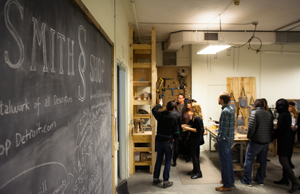
Ponyride, in Detroit, is an example of the type of space where different expertises can come together and generate new ideas.
Why do some places seem to produce more innovation than others? Author Stephen Johnson and Knight Foundation are diving in to that question, with an answer that seems awfully familiar: it’s about having attractive spaces in vibrant downtowns where lots of people can interact.
In a Knight-hosted webinar Friday, Johnson explained that innovation is a function of social networks: it’s not just how many people you know, but how different types of expertise they cover. “If you’re living entirely within one field, [that’s] great for incremental change, but you’re missing out on entirely new ideas.”
Citing the work Growth, innovation, scaling, and the pace of life in cities, Johnson suggested that larger cities are better positioned to support wealth creation through innovation-but that it doesn’t happen automatically. Cities can increase their odds by creating physical spaces that support the cross-pollination of ideas, leading to innovation: co-working venues and makerspaces, where individuals can work with both tools and ideas that are outside of their personal experience.
Doing this right requires engaging the users to determine what the needs and opportunities are (sounds like placemaking!) and then investing in the execution. Johnson suggests that cities can “apply the Kickstarter model” to back the creation of these innovation spaces, using public funds to match the pooled investments of the participants.
We can crowd-source ideas for how communities should work and then crowd-fund the implementation – @stevenbjohnson #knightcities
Knight Foundation (@knightfdn) May 2, 2014
Beyond fostering these local spaces for individual cross-pollination, our economic future requires that we consider how we bring people together across industries at the macro scale. This is especially a challenge in Southeast Michigan, which last year ranked worst out of the nation’s 100 largest metros for “job sprawl” that is, metro Detroit’s jobs were further-flung across the region than in any other metro area in the country, a substantial hurdle to interactions across expertise. (Grand Rapids, our other entry in the top 100, actually has a higher level of job centralization than the national metropolitan average.) To address this, we need to strengthen our downtowns, large and small, as spaces for interaction, and continue working towards the regional transit networks that can knit them together.
This fall, Johnson, Knight Foundation, and Nutopia will be launching an online “innovation hub” of ideas for “practices that spark innovation and inform city planning”. In the meantime, check out our collection of Michigan-based resources on placemaking for entrepreneurship and our May 14 webinar on how Michigan’s new crowdfunding legislation can be used to support placemaking and local entrepreneurship.